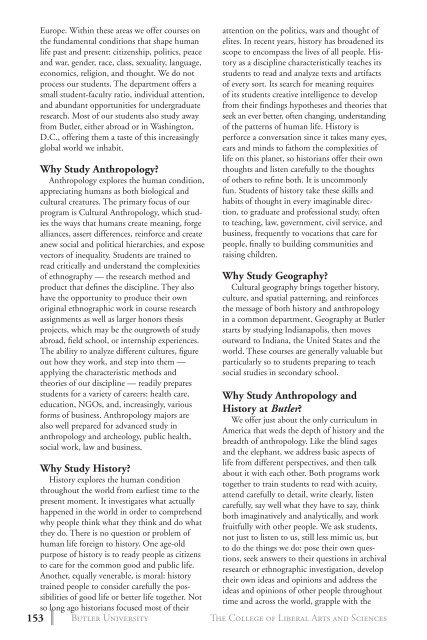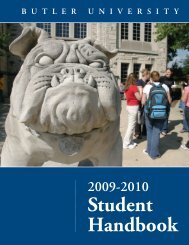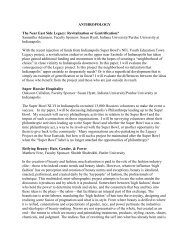2 0 1 3 bulletin - Butler University
2 0 1 3 bulletin - Butler University
2 0 1 3 bulletin - Butler University
You also want an ePaper? Increase the reach of your titles
YUMPU automatically turns print PDFs into web optimized ePapers that Google loves.
Europe. Within these areas we offer courses on<br />
the fundamental conditions that shape human<br />
life past and present: citizenship, politics, peace<br />
and war, gender, race, class, sexuality, language,<br />
economics, religion, and thought. We do not<br />
process our students. The department offers a<br />
small student-faculty ratio, individual attention,<br />
and abundant opportunities for undergraduate<br />
research. Most of our students also study away<br />
from <strong>Butler</strong>, either abroad or in Washington,<br />
D.C., offering them a taste of this increasingly<br />
global world we inhabit.<br />
Why Study Anthropology?<br />
Anthropology explores the human condition,<br />
appreciating humans as both biological and<br />
cultural creatures. The primary focus of our<br />
program is Cultural Anthropology, which studies<br />
the ways that humans create meaning, forge<br />
alliances, assert differences, reinforce and create<br />
anew social and political hierarchies, and expose<br />
vectors of inequality. Students are trained to<br />
read critically and understand the complexities<br />
of ethnography — the research method and<br />
product that defines the discipline. They also<br />
have the opportunity to produce their own<br />
original ethnographic work in course research<br />
assignments as well as larger honors thesis<br />
projects, which may be the outgrowth of study<br />
abroad, field school, or internship experiences.<br />
The ability to analyze different cultures, figure<br />
out how they work, and step into them —<br />
applying the characteristic methods and<br />
theories of our discipline — readily prepares<br />
students for a variety of careers: health care,<br />
education, NGOs, and, increasingly, various<br />
forms of business. Anthropology majors are<br />
also well prepared for advanced study in<br />
anthropology and archeology, public health,<br />
social work, law and business.<br />
attention on the politics, wars and thought of<br />
elites. In recent years, history has broadened its<br />
scope to encompass the lives of all people. History<br />
as a discipline characteristically teaches its<br />
students to read and analyze texts and artifacts<br />
of every sort. Its search for meaning requires<br />
of its students creative intelligence to develop<br />
from their findings hypotheses and theories that<br />
seek an ever better, often changing, understanding<br />
of the patterns of human life. History is<br />
perforce a conversation since it takes many eyes,<br />
ears and minds to fathom the complexities of<br />
life on this planet, so historians offer their own<br />
thoughts and listen carefully to the thoughts<br />
of others to refine both. It is uncommonly<br />
fun. Students of history take these skills and<br />
habits of thought in every imaginable direction,<br />
to graduate and professional study, often<br />
to teaching, law, government, civil service, and<br />
business, frequently to vocations that care for<br />
people, finally to building communities and<br />
raising children.<br />
Why Study Geography?<br />
Cultural geography brings together history,<br />
culture, and spatial patterning, and reinforces<br />
the message of both history and anthropology<br />
in a common department. Geography at <strong>Butler</strong><br />
starts by studying Indianapolis, then moves<br />
outward to Indiana, the United States and the<br />
world. These courses are generally valuable but<br />
particularly so to students preparing to teach<br />
social studies in secondary school.<br />
Why Study Anthropology and<br />
History at <strong>Butler</strong>?<br />
We offer just about the only curriculum in<br />
America that weds the depth of history and the<br />
breadth of anthropology. Like the blind sages<br />
and the elephant, we address basic aspects of<br />
life from different perspectives, and then talk<br />
Why Study History?<br />
about it with each other. Both programs work<br />
History explores the human condition<br />
together to train students to read with acuity,<br />
throughout the world from earliest time to the<br />
attend carefully to detail, write clearly, listen<br />
present moment. It investigates what actually<br />
carefully, say well what they have to say, think<br />
happened in the world in order to comprehend<br />
both imaginatively and analytically, and work<br />
why people think what they think and do what<br />
fruitfully with other people. We ask students,<br />
they do. There is no question or problem of<br />
not just to listen to us, still less mimic us, but<br />
human life foreign to history. One age-old<br />
to do the things we do: pose their own questions,<br />
seek answers to their questions in archival<br />
purpose of history is to ready people as citizens<br />
to care for the common good and public life.<br />
research or ethnographic investigation, develop<br />
Another, equally venerable, is moral: history<br />
their own ideas and opinions and address the<br />
trained people to consider carefully the possibilities<br />
of good life or better life together. Not<br />
ideas and opinions of other people throughout<br />
time and across the world, grapple with the<br />
so long ago historians focused most of their<br />
153 <strong>Butler</strong> <strong>University</strong><br />
The College of Liberal Arts and Sciences
















